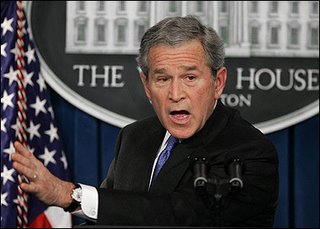In his ongoing efforts to reduce his vocabulary to the smallest number of words possible, Shrub has pretty much stopped using any adjective except “interesting.” Today, for example, on the SOTU: “it’s an interesting experience to walk out there”; on meeting Alito’s law clerks: “an interesting experience”; on the Palestinian elections: “very interesting”, “an interesting day”; on budget talks: “that’s going to be an interesting discussion”. It’s just about the least communicative adjective he could choose, conveying almost no information. It’s public speaking by the lazy for the lazy; the listener isn’t supposed to think any harder about the meaning of the sentence than Bush did in formulating it.
 The Palestinian elections provide Bush an opportunity – an interesting opportunity – to go all Federalist Papers on the meaning of democracy:
The Palestinian elections provide Bush an opportunity – an interesting opportunity – to go all Federalist Papers on the meaning of democracy:You see, when you give people the vote, you give people a chance to express themselves at the pollsDude, you’re blowing my mind.
-- and if they’re unhappy with the status quo, they’ll let you know. That’s the great thing about democracy, it provides a look into society.But “if your platform is the destruction of Israel, it means you’re not a partner in peace. And we’re interested in peace.” Yeah, peace is interesting.
Actually, his words really do give an insight into his view of democracy, despite himself. The election was “a wake-up call to the leadership” which “should open the eyes of the old guard”; “one way to figure out how to address the needs of the people is to let them express themselves at the ballot box”; “If government hadn’t been responsive, I’m not the least bit surprised that people said, I want government to be responsive.” This is a top-down model, in which leaders listen to the people, respond to them, take their views under advisement, but aren’t really controlled by them.
In defending the “terrorist surveillance program,” Bush uses the phrase “connecting the dots,” which we’ve been hearing several times a day from one Bushie or another. I wonder if they focus-grouped it?
On domestic spying: “And I’m intending to use that power -- Congress says, go ahead and conduct the war, we’re not going to tell you how to do it.”
 On the pictures with Abramoff, “I’m also mindful that we live in a world in which those pictures will be used for pure political purposes, and they’re not relevant to the investigation.” Of course he met with Abramoff for purely political purposes, Abramoff was a purely political operator, so what’s your point?
On the pictures with Abramoff, “I’m also mindful that we live in a world in which those pictures will be used for pure political purposes, and they’re not relevant to the investigation.” Of course he met with Abramoff for purely political purposes, Abramoff was a purely political operator, so what’s your point?No one bothered to ask about the Damadola airstrike, so I guess there wasn’t much point to forgoing the usual questions when he met the Pakistani prime minister (Rumsfeld also skipped a Q&A after his meeting). Molly Ivins has the question I’d like to see asked: “Are you the worst president since James Buchanan, or have you never heard of him?”

No comments:
Post a Comment